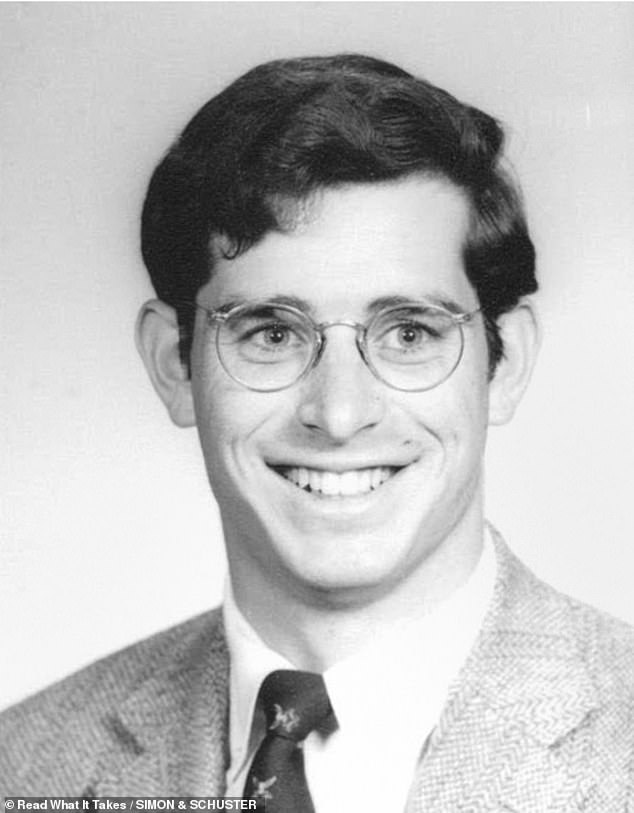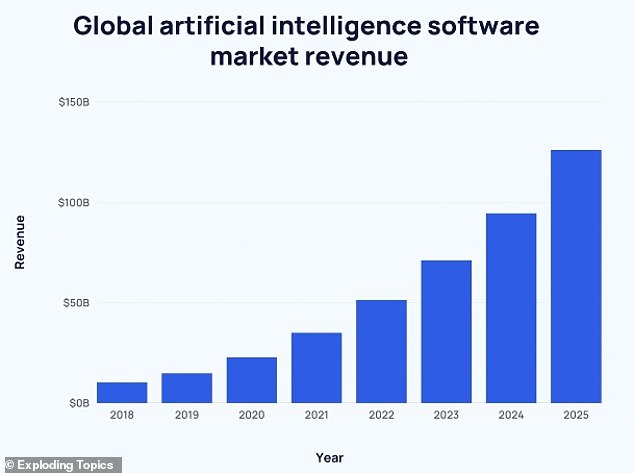Is this AI’s LEAST likely cheerleader? The 77-year-old Republican megadonor CEO of Blackstone has pumped half a billion into cutting-edge technology – even though he still uses a flip phone and says ’email’ is his favorite app
When you think of artificial intelligence leaders, you probably picture sneaker-wearing, baby-faced Silicon Valley types like Mark Zuckerberg and Sam Altman.
But one of the biggest backers of AI is 77-year-old Blackstone CEO and Republican megadonor Steve Schwarzman, who says his favorite app is “email.”
Schwarzman, who was using a simple flip phone at the time, became enamored with AI in 2015 when Alibaba’s co-founder told him that AI was the wave of the future and would change functions, drug development and education.
Since then, Schwarzman has invested more than $500 million in the advancement of AI and donated millions of dollars to Yale University to establish a center for AI developments and the University of Oxford’s Institute for Ethics in AI .
Steve Schwarzman has invested billions of dollars in AI technology, but still says his favorite app is email

Steve Schwarzman had a brief stint in the US Army Reserve in 1970 before attending Harvard Business School
Amid concerns about an AI takeover, Schwarzman, who is worth $37.8 billion, is now working to promote AI and reassure the public that the technology is intended to help with everyday tasks, not humans to replace.
Schwarzman was in China trying to raise money for his Schwarzman Scholars program – a fully funded, one-year master’s degree and leadership program at Tsinghua University in Beijing, China – when he happened to meet Jack Ma, the co-founder of e-commerce giant Alibaba .
The pair discussed the topic for 90 minutes while on the bus to Beijing, when Ma told him that the effects of AI “would be amazing.”
“A lot of bad things can happen, like massive unemployment if you replace people with machines,” Ma told Schwarzman, Forbes reported.
When Schwarzman returned to the US, he met with then-MIT President L. Rafael Reif and asked him why AI had not taken off in the US while Chinese AI development was already well underway.
“I discussed with him the risk element and the fact that the US was falling behind just because we didn’t invest enough money compared to China,” Schwarzman told the newspaper.
‘It’s not just AI. There are other technologies that pose major security concerns. For example, quantum (computing) has the ability to break all encryption. Imagine a world where someone can destroy your banking system, your electrical grid, and take control of your nuclear codes.
“This whole revolution in computer science poses a lot of problems.”
Reif told him that computers were not yet powerful enough to adopt AI technology, but that they were quickly catching up.
“I was concerned that the US would fall behind on the most promising new technology in generations,” Schwarzman said The Wall Street Journal.
Meanwhile, Schwarzman was also busy building today’s leading investment firm Blackstone, and Reif regularly visited his Park Avenue office to discuss his plans to introduce AI to MIT.
Reif said he planned to hire twice as many MIT faculty and professors with experience in computer science, biology and business administration, who also used AI to aid in their research.
Schwarzman liked the idea and donated $350 million of the $1.2 billion needed to fund the program.
But despite pioneering AI to make the world more equal, the United Nations accused Schwarzman of his company contributing to the 2019 global housing crisis.
The UN said Blackstone was exploiting tenants and “wreaking havoc” in communities by drastically increasing rental costs and charging high fees for repairs, which has “devastating consequences” for many tenants. The guard reported at the time.
Blackstone denied the allegations, saying the report contained “numerous false claims, significant factual errors and inaccurate conclusions.”

Steve Schwarzman worked to pioneer AI technology and ultimately donated $350 million to MIT’s $1.2 billion plan to add teachers with AI experience

AI is on the rise and so are concerns that it will replace humans in the job market
Schwarzman has also been criticized for comments he made in 2010 when he compared then-President Barack Obama’s plans to raise taxes to conditions in Nazi Germany.
During a board meeting at a nonprofit organization, Schwarzman told board members that the tax increase is “war.”
“It’s like when Hitler invaded Poland in 1939,” he said.
Schwarzman later apologized for the comparison.
And while Schwarzman has been praised for his commitment to advancing AI through strategic investments in MIT, the New York Public Library, and the $7 billion data center alliance with Digital Reality Trust, this has been overshadowed by other, less admirable actions.
Schwarzman was part of a Blackstone Group forum created in 2016 to offer their economic expertise to then-President Donald Trump.
“You are doing profound things,” Schwarzman told Trump at a White House event in early 2017.
He added that Trump “took on enormous, embedded problems and … with the kind of effort that can be made, you can do amazing things.”
The group disbanded in 2017 after coming under pressure to distance itself from Trump after the then-president equated white supremacists with Black Lives Matter protesters in Charlottesville, Virginia.
Then, in February 2021, just a month after Trump supporters stormed the US Capitol on January 6, the Wall Street billionaire was criticized for supporting Republicans who had tried to overturn the 2020 presidential election.
According to the Center for Responsive PoliticsSchwarzman was the third largest donor to Republicans opposed to the 2020 election, and the eighth largest megadonor in the 2020 election cycle.
In stark contrast to his political ties, Schwarzman has also made extensive donations to AI funding and was instrumental in pushing for the Chips and Science Act in 2022 – which set aside money for quantum computing and AI.
Since hiring Blackstone’s first data scientist the same year he met Ma, that number has grown to 50 people analyzing data using AI to help the company predict apartment demand and analyze data on LinkedIn to know which life science companies may need employees and laboratory space.
“AI will dramatically change the way we live and work,” said Jon Gray, president and CEO of Blackstone.
“As a company, we are dedicating enormous resources to taking advantage of these opportunities – both to protect investors’ capital and to generate higher returns.”
The company says it invests not only in ‘companies that leverage AI, but also in the companies that make this possible.’
Schwarzman and Gray’s efforts come amid global concerns that AI is growing so fast that it will eventually replace humans in the workplace, but Schwarzman again made the case for AI, saying there’s nothing to worry about.
“Everyone involved with this technology (AI) that I know certainly wants the technology to be regulated to some degree because they don’t want bad outcomes and all these good outcomes,” Schwarzman told me. Private assets.
He continued, “It’s not supposed to replace you. It should make you more effective faster.”
